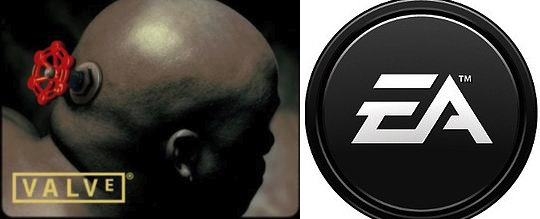
It looks like a few new jabs have been made in the ongoing fight between EA’s Origin and Valve’s Steam, the two largest video game digital distribution services on the Internet. Unlike the famous Hatfield and McCoy feud, the dispute between these giant companies is a little more serious than a fight over bad grammar (that’s what started the Hatfield and McCoy thing right? I missed that Kevin Costner show). Origin and Steam are actually fighting about video games. This is serious stuff.
It all began because of distribution disputes and a fear of cannibalizing properties, causing EA to pull some of their games from Steam’s online store. That’s when the Internet saw that a fight was on, and it’s still going strong.
Last month, David DeMartini, the man who runs Origin, said that Steam has a tendency to cheapen intellectual properties. He argued that the giant sales and deep discounts (sometimes up to 75% off) set a bad precedent and train consumers to wait and not buy games at full price.
DeMartini told Game Industry International, "What Steam does might be teaching the customer, 'I might not want it in the first month, but if I look at it in four or five months, I'll get one of those weekend sales and I'll buy it at that time at 75 percent off.'”
In the same interview, DeMartini says “We’re not trying to be Target. We’re trying to be Nordstrom.” The point he’s trying to make is that they want to focus on value. He wants people to think that their products are well-priced and, most importantly, that they’re worth it.
This month, Valve’s chief of business development, Jason Holtman, gave his rebuttal to Eurogamer. He said, “If we thought having a 75 percent sale on Portal 2 would cheapen Portal 2, we wouldn't do it.” He also says that if they were actually cheapening IPs and training gamers to wait for a sale, pre-purchases and day-one sales would be down, which he claims isn’t the case.
“Pre-orders are bigger than they used to be….And our day one sales are bigger than they used to be. Our first week, second week, third week, all those are bigger,” Holtman told Eurogamer.
In the end, what’s going to matter the most in this Origin vs. Steam feud is which company understands gamers better. As of right now, Steam has the lead. They currently boast 40 million active users while Origin is said to only have 11 million. EA is doing everything they can to catch up, including making it easier for indie developers to sell their game through the Origin service. However, they are likely to have an uphill battle, especially if they are trying to be the Nordstrom to Steam’s Target.
To me, DeMartini only seems to have a loose understanding of the way gamers shop. In fact, I think he only has a loose understanding of consumers in general. By his argument, if everyone waited for everything to be on sale, no one would ever buy a new car. Everyone would just buy used. Of course, we know this isn’t the case. People buy new cars every day.
Holtman is thinking along these same lines saying, "Even now, as DVDs come out even faster, you'd just be like, heck, I'll just wait and get the DVD and me and 10 friends will watch it. But people still like to go to theaters because they want to see it first, or they want to consume it first.”
Most gamers don’t shop casually for new titles, they know what they want before it comes out. They pay attention, watch videos online, read previews and typically follow the hype. For the most part, if a gamer wants a game, they’ll buy it the moment they can, no matter the price. What Valve does with events like the Summer Sale is give developers the opportunity to reach players that might not have ever bought their game. Those same players might find that they love the discounted game and eventually pre-order the next installment.
By not embracing sales and deep discounts, DeMartini is limiting how many people might buy the next big sequel on Origin. He fails to realize that some people will never pay full price for a certain game. He also likely has a hard time understanding the debate over used and rented games. People are often frugal and will do what they can to spend less. With Valve's sales, developers still get to see some revenue, unlike with used games. To be fair, DeMartini says there will be sales on Origin, just not very big ones.
It all comes back to that Nordstrom and Target metaphor. If David DeMartini’s Origin is set on being the Nordstrom of digital distribution, they will never overcome Jason Holtman and Steam. Let’s just look at the numbers: Nordstrom’s total revenue last year was 10.3 billion dollars, but Target’s was 69.9 billion. Which company would you rather be?
VentureBeat's mission is to be a digital town square for technical decision-makers to gain knowledge about transformative enterprise technology and transact. Learn More
